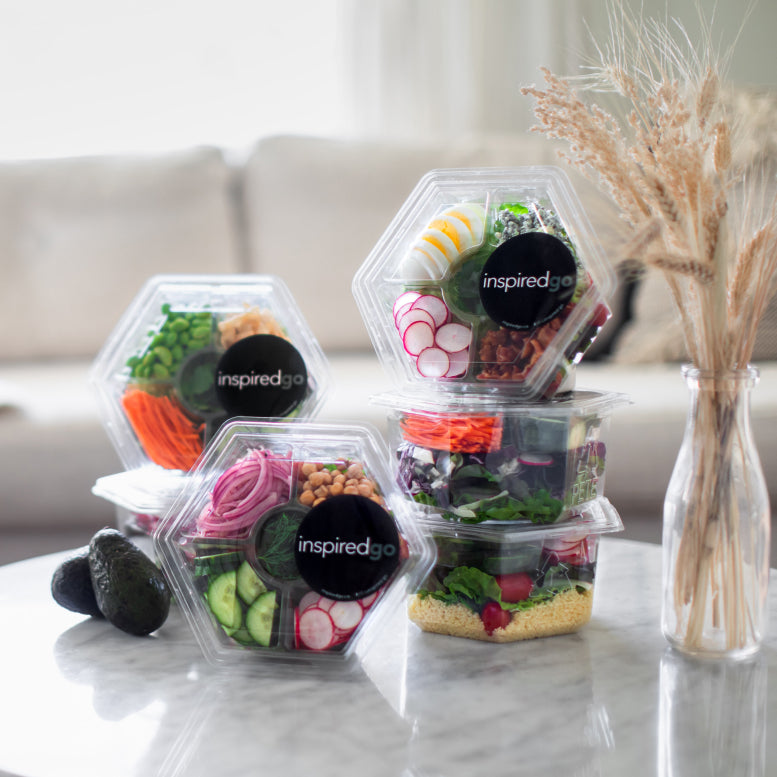What Type Of Greens Are Best For Vegan Salads?
Table of Contents
1. The Best Greens for Vegan Salads
2. What Makes Vegan Salads a Healthy Meal Choice?
3. What Are Vegan Protein Sources for Salads?
4. How Does Inspired Go Support Vegan Based Diets?
1. The Best Greens for Vegan Salads
Choosing the right type of greens for your vegan salads can significantly enhance their nutritional value and taste. Leafy greens are an essential part of any diet, especially a vegan one, providing an array of vitamins, minerals, and fiber. Romaine lettuce is a popular choice, packed with Vitamin A and K. Spinach is another superb option, rich in iron, calcium, and magnesium. For a peppery kick, consider adding arugula, which also has high nitrate content, promoting good heart health. Kale is a nutrient-dense superfood, offering vitamins A, K, and C, along with antioxidants. For a unique flavor profile, try incorporating watercress or Swiss chard into your vegan salads. Remember, variety is key to ensuring a balanced diet, so don't hesitate to mix and match these greens for your meals.
Order fresh salads today →


2. What Makes Vegan Salads a Healthy Meal Choice?
Vegan salads are a powerhouse of nutrition, offering a vibrant mix of greens, vegetables, plant proteins, and healthy fats that support overall wellness. Unlike many processed meals, vegan salads are made from whole, natural ingredients that provide essential vitamins, minerals, and antioxidants the body needs to thrive. High in fiber, they promote better digestion, balanced blood sugar levels, and long-lasting satiety while being naturally low in saturated fats and cholesterol. Ingredients such as leafy greens, avocado, nuts, and legumes create a nutrient-rich foundation that nourishes the body without leaving you feeling heavy or sluggish. Regularly incorporating vegan salads into your diet can also help reduce inflammation, support heart health, and boost immune function. With their mix of color, flavor, and texture, vegan salads make eating healthy enjoyable and effortless while delivering significant long-term benefits.
Choose your salads and schedule delivery →
3. What Are Vegan Protein Sources for Salads?
Protein is an essential part of any balanced meal, and vegan salads offer plenty of plant-based options to meet your daily needs. Ingredients like chickpeas, lentils, quinoa, tofu, tempeh, and edamame are all excellent sources of high-quality protein, delivering the amino acids needed for muscle repair and sustained energy. Seeds and nuts, such as pumpkin seeds, almonds, and sunflower seeds, not only boost protein content but also add crunch and healthy fats to your meal. These proteins help keep you full for longer, making vegan salads a satisfying choice for lunch or dinner. When combined thoughtfully with fresh vegetables and whole grains, these plant-based proteins can provide a complete nutritional profile that supports active lifestyles and overall wellness, making vegan salads a reliable, nutrient-packed option for daily meals.
Get fresh salads and snacks delivered →
4. How Does Inspired Go Support Vegan Based Diets?
One of the biggest challenges of eating vegan consistently is keeping meals both balanced and exciting over time. Inspired Go takes care of this by offering a rotating menu of vegan salads that deliver variety, flavor, and complete nutrition without effort on your part. Each salad is prepared fresh daily with premium plant-based ingredients, thoughtfully combined to keep you full, energized, and satisfied. By removing the time-consuming steps of meal prep and giving you access to convenient, high-quality vegan options, Inspired Go helps turn healthy eating into an easy, repeatable habit. Our service is designed to support your lifestyle and goals long-term, making plant-based living a simple, sustainable choice that you can enjoy every single day without the stress of planning, shopping, or cooking.
Try our fresh, ready-to-eat salads →
Frequently Asked Questions
The most nutritious salad greens are dark leafy varieties like spinach, kale, and arugula. These greens are packed with essential vitamins, including A, C, and K, as well as minerals like calcium and iron. Kale is particularly rich in antioxidants, while spinach offers significant amounts of folate and magnesium. Choosing a mix of dark greens enhances both the flavor and nutritional value of your salad.
A healthy salad includes a balance of nutrient-dense ingredients like leafy greens, fresh vegetables, lean proteins, and healthy fats. For example, a base of spinach and kale, paired with grilled chicken, cherry tomatoes, avocado, and a light olive oil dressing, creates a wholesome meal. Avoid fried toppings or sugary dressings, as they add empty calories, and opt for natural ingredients to maximize nutrition.
Yes, eating salad daily is a healthy habit when it includes a variety of fresh, nutrient-rich ingredients. Salads offer fiber for digestion, antioxidants for immunity, and essential nutrients like potassium and folate. Regularly eating salads can support weight management and improve energy levels. To avoid monotony, vary your greens, proteins, and toppings to keep meals satisfying and nutritionally balanced.
Healthy salad dressings are typically made with simple, natural ingredients. Olive oil-based dressings, paired with balsamic vinegar or fresh lemon juice, provide healthy fats and enhance flavor without unnecessary calories. Avoid store-bought dressings with high sugar or preservatives. For a creamy alternative, opt for homemade dressings using Greek yogurt or avocado for added nutritional benefits.
Yes, salads are incredibly beneficial for overall health when prepared with fresh, whole ingredients. They are low in calories and high in vitamins, minerals, and antioxidants, supporting heart health, digestion, and immunity. Adding a mix of proteins and healthy fats creates a satisfying, nutrient-dense meal. Regularly incorporating salads into your diet can promote long-term well-being and energy.

